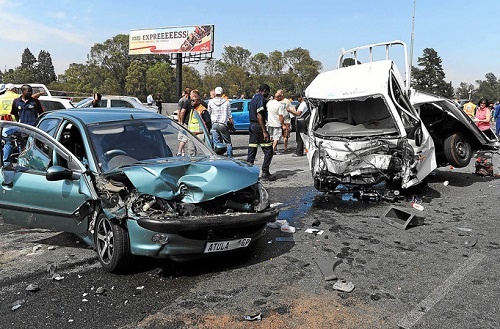Ghana’s roads have become increasingly dangerous, with over 4,700 crashes recorded in just four months. The alarming rise in accidents has raised concerns about road safety, enforcement of traffic laws, and infrastructure improvements. According to the National Road Safety Authority (NRSA), the number of crashes has surged significantly compared to previous years, leading to more injuries and fatalities (GBC Ghana).
The Rising Numbers and Their Impact
Between January and April 2025, Ghana recorded 4,700 road crashes, involving thousands of vehicles and resulting in hundreds of deaths. This marks a sharp increase compared to the same period in 2024, when the country saw 3,900 crashes. According to NRSA, road crashes in Ghana resulted in 15,690 injuries and 2,373 deaths in 2022, highlighting the severity of the issue. Experts attribute this surge to reckless driving, poor road conditions, and inadequate enforcement of traffic regulations (Modern Ghana).
The Greater Accra, Ashanti, Eastern, and Central Regions account for the highest number of accidents, with over 70% of crashes occurring in these areas. Many roads in these regions suffer from potholes, faded markings, and malfunctioning traffic lights, making navigation difficult and increasing the risk of collisions in a report by GBC Ghana.
Key Causes of the Crisis
Several factors contribute to Ghana’s worsening road safety situation.
One major issue is speeding, which remains a leading cause of accidents. Many drivers ignore speed limits, especially on highways, leading to fatal crashes. The Accra-Kumasi highway and the Tema motorway are among the most dangerous roads, with hundreds of deaths recorded annually as cited in Modern Ghana reportage.
GBC Ghana news also indicated that another concern is drunk driving, which has been linked to an average of 32 deaths per day.
Despite awareness campaigns, many drivers continue to operate vehicles under the influence of alcohol, putting themselves and others at risk.
According to NRSA, road accidents related to impaired driving remain a serious challenge that requires stronger enforcement and public education
Additionally, poor driving skills and lack of adherence to traffic laws contribute to the crisis. Many drivers fail to obey stop signs, traffic signals, and pedestrian crossings, leading to unnecessary accidents. The NRSA has urged stricter enforcement of traffic laws to curb these violations
Solutions and Government Initiatives
Addressing Ghana’s road safety crisis requires immediate intervention through multiple approaches.
Many highways and urban roads suffer from potholes, faded lane markings, poor drainage systems, and malfunctioning traffic signals, all of which contribute to accidents. The NRSA has called for major road repairs, especially in accident-prone regions like Greater Accra, Ashanti, and Eastern, ensuring that highways and city roads are properly marked and free of hazards.
Stricter Law Enforcement
To curb reckless driving, Ghana needs stronger law enforcement policies. The Motor Traffic and Transport Department (MTTD) of the Ghana Police Service has been increasing patrols to catch speeding drivers, drunk drivers, and road law violators. However, enforcement remains inconsistent.
The NRSA has suggested automated speed cameras, heavier fines, and mandatory road safety training for commercial drivers to improve compliance.
Public Education and Awareness Campaigns
The NRSA regularly conducts road safety awareness campaigns, targeting both private and commercial drivers. Initiatives like Stop the Knock and Stay Alive educate drivers on speed limits, safe overtaking, and avoiding distractions. Expanding these campaigns to reach more motorists, pedestrians, and transport unions could significantly reduce risky behaviors.
Transport Unions and Their Role in Road Safety
Transport unions play a crucial role in shaping road safety policies in Ghana. Organizations like the Ghana Private Road Transport Union (GPRTU) and Concerned Drivers Association have been vocal about improving driver training, enforcing vehicle maintenance standards, and lobbying for better road conditions. Collaboration between these unions and the government could strengthen enforcement efforts and encourage safer driving practices across Ghana.
Smart Traffic Systems and Automated Enforcement
One of the most anticipated advancements is the introduction of smart traffic monitoring systems and automated speed enforcement cameras. The NRSA says, these tools will track speeding vehicles, capture violations, and issue fines automatically. The goal is to reduce reckless driving and improve compliance with speed limits, particularly on high-risk roads like the Accra-Kumasi Highway and Tema Motorway.
Looking Ahead
These technological innovations and infrastructure projects offer hope for a safer road network in Ghana. While challenges remain, the government’s multi-sector approach including better law enforcement, improved road designs, and enhanced emergency response systems,could significantly reduce traffic accidents and fatalities in the coming years.




